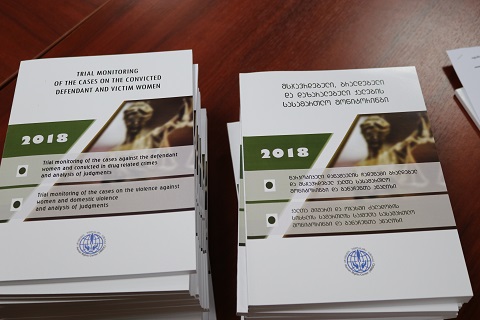HRC Presented the Report “Trial Monitoring of the Cases on the Convicted, Defendant and Victim Women”
June 19, 2018

Natia Gogolashvili
On June 14, HRC presented the report “Trial Monitoring of the Cases on the Convicted, Defendant and Victim Women”. The project aimed to promote transparency of court hearings into the drug-related criminal cases against convicted, defendant and victim women and to increase accountability of the judiciary and prosecution bodies.
The monitoring report reveals the main tendencies and challenges, which were observed in the course of trial monitoring and analyzes judgments over criminal cases, which went in force.
The authors of the research requested information about registered and solved violent crimes in the period from January 1, 2017 to February 1, 2018, where victims were women. The report reads that in accordance to the provided information, the MIA does not conduct gender-based statistical analysis of the processed cases, which could enable us to estimate how many victims were women in the registered and solved crimes.
HRC addressed the LEPL “112” of the Ministry of Internal Affairs and requested information about phone calls the ”112” had received with regard to the cases of domestic violence and violence against women from January 1, 2017 to February 1, 2018. In response to the requested information, LEPL “112” answered that “Information about domestic violence/family conflicts, which “112” receives for further reaction cannot be equated with real facts of domestic violence as “112” is the primary source for processing the information. Categorizing of the incidents does not aim to determine contextual similarity of the notification with legislative disposition but accurate identification of the priorities and types of the emergency brigade, which shall be sent to the site of the incident for response.” HRC believes, receipt of the information, its double-checking and processing shall not be particularly difficult.
The authors state that another significant component of the survey was trial monitoring, which aimed to reveal whether the principles of fair trial are ensured in relation to victim women, defendant and convicted women at the proceedings of criminal law.
From January 10, 2018 to May 10, 2018, HRC monitored ongoing trials into criminal cases on violence against women, domestic violence and drug-related crimes in the criminal cases panel of the Tbilisi City Court. In line with the research goals, the monitors selected the cases according to concrete criteria - women were victims and defendants. The HRC monitors monitored 88 criminal cases.
In accordance to the report, no motion was made for recusal or self-recusal in none of the observed 88 cases. With regard to plea bargaining, the monitoring results showed that plea agreements were signed only in 5 out of 88 cases; in 4 of them, the defendant was charged for a drug-related crime and in 1 case the defendant was accused of domestic violence.
During the trial monitoring, court hearings in 23 criminal cases ended in the criminal cases panel of the Tbilisi City Court among which: 21 cases referred to domestic violence and 2 – to the violence against women. In the finalized cases the court ruled: Out of 23 cases the judgment of conviction was passed in regards with 20 cases which included 1 plea agreement; judgment of acquittal was passed in 1 case and in 2 cases the defendant was partly acquitted.
According to the HRC lawyer-monitors, in the observed court hearings, the principles of fair trial were not breached in relation with the victim women of domestic violence or no obstacles were created that could deprive the victim to enjoy her rights to fair trial. During the trial monitoring, judges never demonstrated stereotypical approach towards the victims of domestic violence and violence against women. The monitors said that overload of the pending cases in the Tbilisi City Court often hinders timely hearings into the cases.
As evaluated by the research authors, the number of the judgments of conviction and the type and term of the used sentence, in certain cases, it is not proportionate to the issues of security of victim as the conditional sentence is used as the ultimate type and term of the sentence. The problem of proportionality and security of the victims also becomes an issue when approving plea agreement with the defendants in cases of domestic violence, violence against women and domestic crime.
For the effective and timely response to the facts of domestic violence and violence against women, Human Rights Center recommends the Minister of Internal Affairs to improve mechanisms in order to reveal facts of violence against women, domestic violence and domestic crimes; to conduct effective investigation into violent crimes; to establish the practice for the identification, evaluation and analysis of gender-motivated crimes; to provide victim women with full information about the defense and support mechanisms, including the essence and consequences of the restraining and protective orders.
HRC also recommends to enhance professional capacity of the prosecutors and prosecutor’s office personnel; to train and specialize prosecutors about the cases of domestic violence and violence against women.
HRC monitored the cases of defendant women in drug-related crimes and analyzed the judgments against the women for the same category of crimes. Detailed information about the monitoring is available in the article Drug-Policy in Georgia is unfairly strict and inhuman.
The report was prepared in the frame of the project Trial Monitoring for Women”, which is implemented by Human Rights Center with the Bulgarian Development Aid.
News
December 13, 2023
Ethnic minorities outside the peace dialogue
November 6, 2023
‘Peace’ agenda of political parties
Popular
Articles
February 13, 2024



